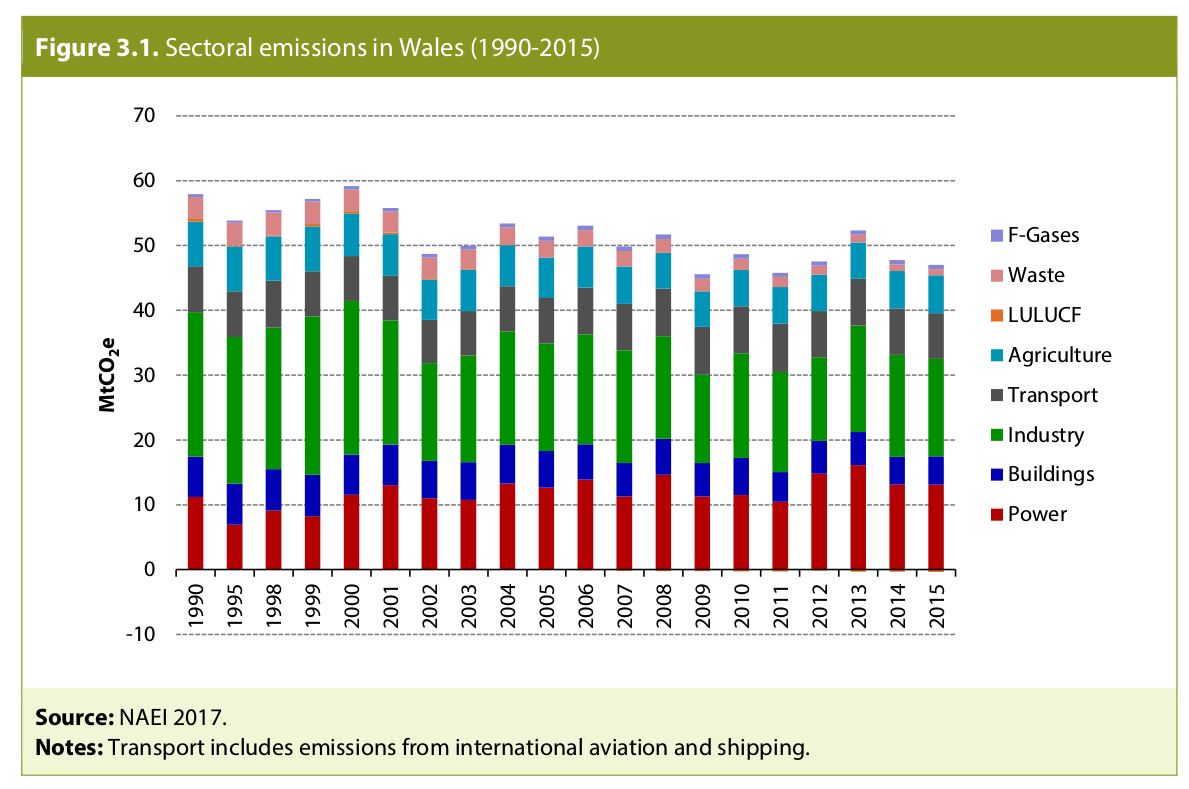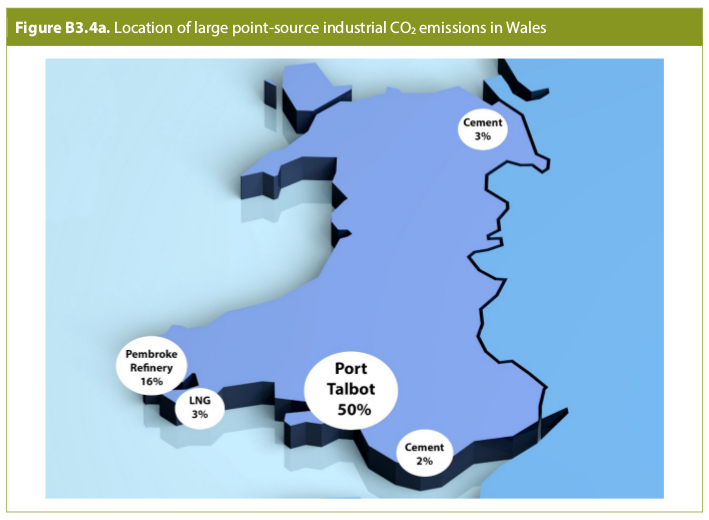Wales: Low Carbon Pathways Consultation
Fy nodiadau i baratoi ar gyfer ymgynghoriad llwybr carbon isel Cymru.
The following are my brief notes from researching the linked reports and consultation document for the 'A low carbon pathway for Wales' consultation (4th of October 2018). See: https://beta.gov.wales/low-carbon-pathway-wales
Building a low-carbon economy in Wales: Setting Welsh carbon targets - December 2017
The consultation document heavily references the 'Building a low-carbon economy in Wales: Setting Welsh carbon targets' report by the Committee on Climate Change, available here: https://www.theccc.org.uk/publication/building-low-carbon-economy-wales-setting-welsh-carbon-targets/
The report details both present and historic CO2 emissions in Wales and proposes targets for reducing emissions by at least 80% by 2050 based on 1990 levels. The following interim targets in bold are proposed (end of 2018):
1990: 0%
2015: 19% (0.76%/y)
2020: 27% (1.6%/y) or 32% if Aberthaw closes by 2020
2030: 45% (1.8%/y)
2040: 67% (2.2%/y)
2050: 80-85% (1.8%/y)Emissions paths assume significant net CO2 removals (negative emissions after reaching net zero: afforestation, bioenergy with carbon capture and storage, direct air capture etc). Without these CO2 removals at scale, emissions would need to reduce earlier than 80% by 2050.
Wales has reduced its GHG emissions by 19% below 1990 levels to date (not based on consumption emissions - including production of goods for consumption in Wales in other countries).
The following chart details our emissions history:

- Power sector emissions have increased 17% since 1990 due to gas and coal.
- Industry: 31% reduction since 1990, but flat since 2008. Less than the 48% reduction in UK as a whole during which time UK manufacturing output has shown steady growth.
- Direct emissions from buildings are down 26% since 1990, gas boilers and building fabric. Arbed & Nest schemes 45,000 households.
- Waste emissions fallen by 72% since 1990.
- Agriculture emissions fallen 15% since 1990.
- Transport emissions: flat.
Large point-sources of emissions
The report highlights the importance of large point-sources of emissions on the total GHG emissions of Wales. In particular:
- Aberthaw power station (14% of total Welsh greenhouse gas emissions and 51% of Welsh power generation emissions in 2015). "Aberthaw should cease emitting by 2025 under the UK Gov commitment to phase out unabated coal-fired generation, although it may close before this."
- Port Talbot steelworks represented 50% of welsh industrial emissions and 16% of total Welsh emission in 2015.
- Pembroke Refinery and LNG terminal? Contribute 16% and 3% of industrial emissions
- Cement production in both North and South Wales contribute a further 3% and 2% of industrial emissions.
Together these 6 large point-sources of CO2 emissions make up about 38% of total emissions.

Perhaps a second interesting point is that "as Wales is a net-exporter of electricity to England, increased renewable generation increases exports but does not impact significantly on Welsh emissions.". This highlights the importance of a two pronged approach of both building up renewable energy and ensuring that coal and gas is closed. If we only build up renewable energy it does not effect Wales GHG emissions as a whole.
In 2015, 16% of Welsh power generation was from renewables, 12% was from nuclear, 24% from coal (Aberthaw, 51% of emissions), the remainder of generation and emissions from gas-fired plants.
Wales is a net power exporter and has proportionally more industry than the UK as a whole. Wales accounts for 9% of UK-wide emissions, but 5% of the population.
Renewable Energy Target
Renewables generate 43% of welsh consumption today. The Welsh government has a target of 70% by 2030.
- https://gov.wales/newsroom/environmentandcountryside/2017/170928-lesley-griffiths-high-on-ambition-for-clean-energy/?lang=en
- https://gov.wales/newsroom/environmentandcountryside/2017/171207-43-percent-of-wales-electricity-through-renewables-in-2016/?lang=en
- https://gov.wales/topics/environmentcountryside/energy/renewable/energy-generation-in-wales/?skip=1&lang=en
Carbon Capture
The Committee on Climate Change scenario targets 58% of carbon abatement in industry with Carbon Capture and Storage by 2050. No explicit mention as far as I can tell is made of processes such as the Circored process for the renewable energy powered steel production, or other electrification technologies, although these may come under efficiency/innovation?
- Previous notes on renewable steel production (Circored): https://learn.openenergymonitor.org/sustainable-energy/energy/industry-steel
- https://www.outotec.com/products/direct-and-smelting-reduction/circored-hydrogen-based-reduction
There is a brief mention of a Carbon Capture and Utilisation project by Tata Steel (FLEXIS project) http://www.flexis.wales/about/
Electric Vehicles and Buildings
The 'Setting Welsh carbon targets' report makes two brief mentions of electric vehicles
-
"Supporting uptake of ultra-low-emission vehicles. Uptake of electric vehicles has been slow in Wales to date. It is important to develop a better network of charging points, especially in mid-Wales, and tackle other non-financial barriers (e.g. through parking, use of priority lanes, raising awareness and public procurement)."
- "Readiness for or installation of EV charging in new developments."
A relatively brief overview of the standard mitigation solutions for buildings and transport is also given.
Low Carbon Pathway to 2030 Consultation Document
The Low Carbon Pathway to 2030 consultation document builds heavily on the Committee on Climate Change report. There are 31 actions for consultation covering the full range of possible solutions from local energy planning, developing policies on extraction and combustion of fossil fuels, encouraging renewable energy and local ownership, Electric Vehicles and charging networks, building regulations, retrofit, low carbon heat, industry.. all listed in the consultation document here:
https://beta.gov.wales/sites/default/files/consultations/2018-08/low-carbon-pathway-to-2030-consultation.pdf